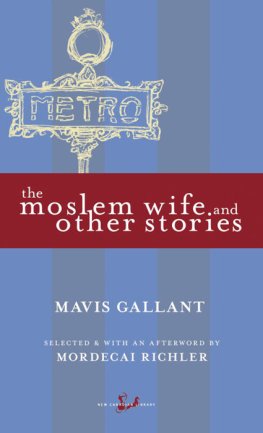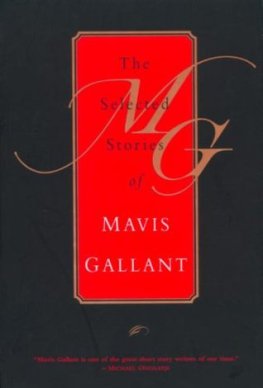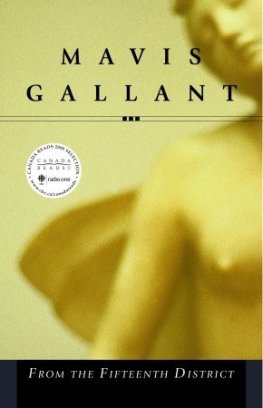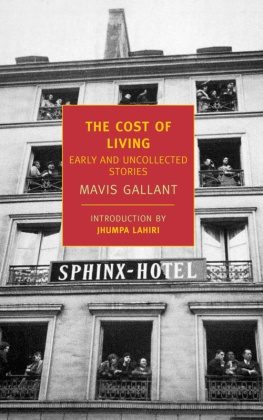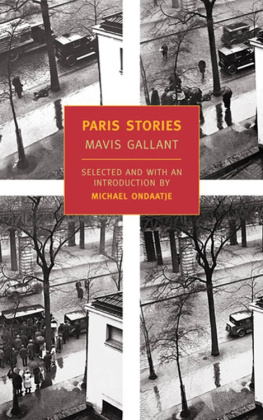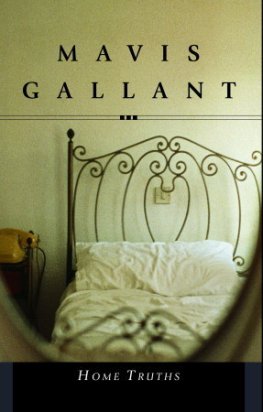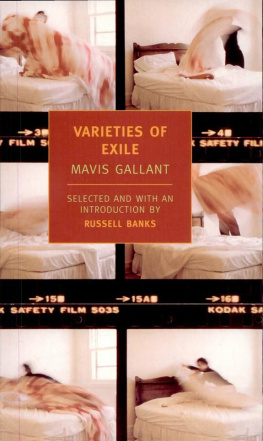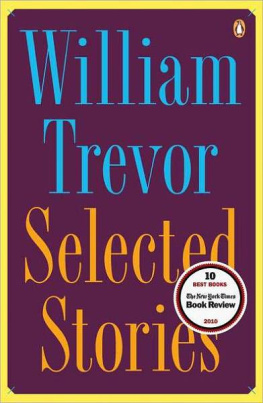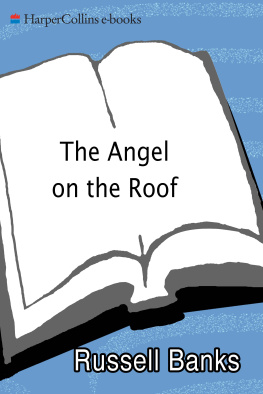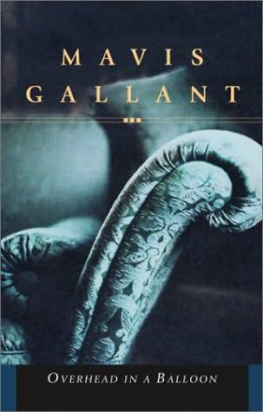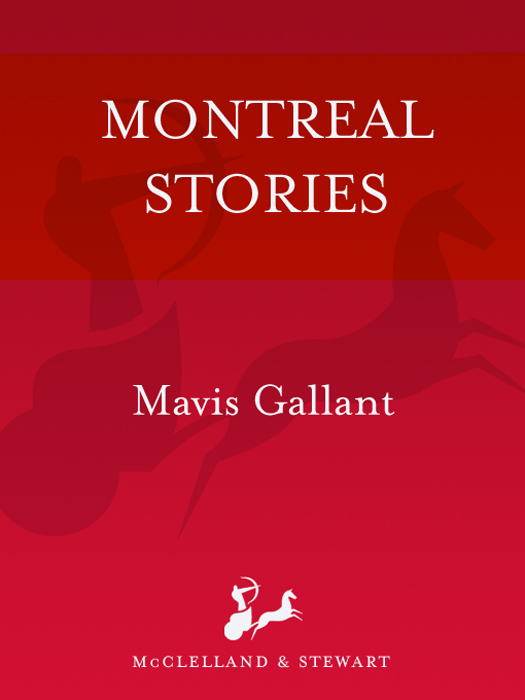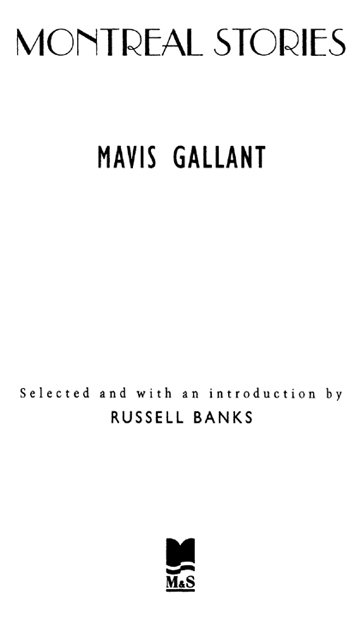BOOKS BY MAVIS GALLANT
DRAMA
What Is to Be Done? (1983)
ESSAYS
Paris Notebooks: Essays and Reviews (1986)
FICTION
The Other Paris (stories, 1956)
Green Water, Green Sky (novel, 1959)
My Heart Is Broken (stories, 1964)
A Fairly Good Time (novel, 1970)
The Pegnitz Junction (stories, 1973)
The End of the World (stories, 1974)
From the Fifteenth District (stories, 1979)
Home Truths (stories, 1981)
Overhead in a Balloon (stories, 1985)
In Transit (stories, 1988)
Across the Bridge (stories, 1993)
The Moslem Wife (stories, 1994)
The Selected Stories of Mavis Gallant (stories, 1996)
Paris Stories, ed. Michael Ondaatje (stories, 2002)
Montreal Stories, ed. Russell Banks (stories, 2004)
Copyright 2004 by Mavis Gallant
Copyright 2004 by NYREV, Inc.
Introduction and selection copyright 2004 by Russell Banks
All rights reserved. The use of any part of this publication reproduced, transmitted in any form or by any means, electronic, mechanical, photocopying, recording, or otherwise, or stored in a retrieval system, without the prior written consent of the publisher or, in case of photocopying or other reprographic copying, a licence from the Canadian Copyright Licensing Agency is an infringement of the copyright law.
National Library of Canada Cataloguing in Publication
Gallant, Mavis, 1922
Montreal stories / by Mavis Gallant ; selected and with an introduction by Russell Banks.
eISBN: 978-1-55199-629-5
I. Banks, Russell, 1940- II. Title.
PS8513.A593M56 2004 C813.54 C2003-905929-4
We acknowledge the financial support of the Government of Canada through the Book Publishing Industry Development Program and that of the Government of Ontario through the Ontario Media Development Corporations Ontario Book Initiative. We further acknowledge the support of the Canada Council for the Arts and the Ontario Arts Council for our publishing program.
Published simultaneously in the United States by The New York Review of Books, under the title Varieties of Exile.
All of the stories in this selection with two exceptions were originally published in The New Yorker. The exceptions are 1933, which was originally published as Dclass in Mademoiselle, and The Fenton Child. With the exception of Let It Pass, In a War, and The Concert Party, all of the stories appear in The Selected Stories of Mavis Gallant (McClelland & Stewart). The Fenton Child, 1933, The Chosen Husband, From Cloud to Cloud, and Florida appear in Across the Bridge (McClelland & Stewart). The Doctor, Voices Lost in Snow, In Youth Is Pleasure, Between Zero and One, and Varieties of Exile appear in Home Truths (McClelland & Stewart). The End of the World and New Years Eve appear in The End of the World (McClelland & Stewart).
McClelland & Stewart Ltd.
75 Sherbourne Street
Toronto, Ontario
M5A 2P9
www.mcclelland.com
v3.1
The author would like to dedicate this volume to William Toye
CONTENTS
INTRODUCTION
I N A CHARACTERISTIC mingling of modesty and fierce pride, Mavis Gallant has said that one of the hardest things in the world is to describe what happened next. Its hard because of the value- and emotion-laden nature, not just of memory, but of human consciousness itself. Though nothing truly escapes us, memory and mind from the moment of our birth are notoriously, almost hopelessly, selective, elliptical, and inventive. And memory and mind, for expression, perhaps for their very existence, depend upon languagethan which, of course, there is no more evasive and deceptive a medium. Now in her eighties, Gallant has spent a long lifetime doing that hardest thing, describing what happened next, in stories that are not only moving and powerful but true to memory and mind. Born and raised bilingual in French-speaking Quebec and residing most of her adult life in France, Gallant chose to write in English, and in it fewer than a handful of living story writers are her equal: William Trevor, and her countrywoman Alice Munro, perhaps, andsince the death of Eudora Weltyno American that I can think of.
The tensionand sometimes outright conflictbetween remembered and felt experience on the one hand and, on the other, the known truth of what happened lies at the heart of all great short stories. Its the argument that generates plot and structure, which, finally, gives a story meaning. Since Gogol and Chekhov, the flexible and still rapidly evolving form of the short story has unfolded that argument, and in doing so it has universalized and dignified the experience, the pain and sorrow and desire and fear, of the ordinary, solitary man, woman, and child. It has extricated the isolato from the masses and made Everyman. Frank OConnor called the modern short story the lonely voice, and more than any other literary form it speaks to and for every human being who thinks of him- or herself as alone, cut off from God, and counted as unimportant and unworthy of attention except when considered en masse. It is, in a sense, the most democratic literary form. And it is in this tradition that Mavis Gallant has made herself a master.
Her stories follow no formula and obey no laws other than Robert Musils one law of life, and that is the law of narrative order. Which is to say, they are digressive, regressive, and circular; they leap forward in time one minute and linger in pockets of loss the next; they ruminate and fulminate and explicate. There are asides, self-reflexive inquiries, and rapid shifts in point of viewnone of which stop or hinder the forward motion of the story. Quite the opposite; they keep the story flowing, like a meandering stream crossing a broad plain to the sea, like consciousness. But Gallants intent is always to dramatize consciousness, not merely to portray it. Consequently, her stories are as difficult to describe or to reduce to a synopsis as any truly lived experience isnot because of their variety or obscurity (her stories are never obscure) or some esoteric quality (her characters, settings, situations, and language are always instantly familiar, intimate, and homegrown, whether planted in Montreal, an Eastern Township village, Paris, Moscow, Florida, or the French Mediterranean), but because of their economy and precision and the sublime integration and inseparability of their elementsform, structure, content, and style.
In terms of locale, her stories, perhaps as a reflection of her somewhat bifurcated life, can be divided roughly between those that take place in Europe, usually Paris, and those set in Canada, usually Montreal and its nearby environs. I have for personal reasons (I am half Canadian with three Canadian grandparents and grew up and live today just south of the border) an abiding affection if not an outright preference for the North American stories, if only because Gallant has attended there to lives that are familiar and matter greatly to me and rarely make it into literature: an adolescent girl, nearly crushed by the claustrophobic religious culture of her family, refusing to exchange her spirit for her soul (The Chosen Husband); a boy, abandoned by his feckless dad, but obliged to care for the old man when, years later, he turns up dying in France (The End of the World); a grown daughter, returning to the city of her childhood, tracking the secret sources of her gauzy memories of her father and mother and their torn marriage (Voices Lost in Snow). None of these characters has money or property or much education; none of them is secure in society. Characters and situations like these seem peculiarly American,


